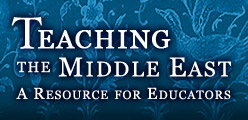About This Resource
Discover the great currents of continuity and change throughout Middle Eastern history…
This resource was written by many of the best scholars in the field of Middle Eastern studies and created in partnership with the National Endowment for the Humanities and three University of Chicago units, the Oriental Institute, the Center for Middle Eastern Studies, and the eCUIP Digital Library Project.
The goal of Teaching the Middle East: A Resource for Educators is to provide teachers of Middle Eastern history and culture with a rich, reliable, and easily accessible resource that draws upon sound humanities scholarship to help build student understanding of Middle Eastern history and culture. Drawing upon the unparalleled expertise of renowned scholars from the University of Chicago, the archaeological resources of a world-famous research facility and museum, and the inherent flexibility and strengths of the Internet, it is our hope that this resource will enhance teaching and learning about the Middle East in the nation’s classrooms.
Academically rigorous, thoughtful, and stimulating, Teaching the Middle East seeks to offer new ways of seeing and understanding by crossing cultural divides and illuminating how our shared human concerns cross oceans, time, and cultures.
The Oriental Institute of the University of Chicago
Originally founded in 1919 to study “the Orient,” the Oriental Institute of the University of Chicago is an internationally recognized center for archaeological excavations, text-based studies, and teaching the history of the ancient Middle East. Within the Oriental Institute is a world-renowned museum that houses a major collection of artifacts from ancient Syria, Anatolia, Mesopotamia, Persia, Israel, Egypt, Nubia and early Islamic societies. With its exceptional collections and integrated programs of research and teaching in the museum context, the Oriental Institute is a unique public resource. It serves a broad range of constituencies both locally and nationally including the University community, the general public, travelers and scholars, college, elementary, and high school students and teachers.
Center for Middle Eastern Studies at the University of Chicago
Since its establishment in 1965, the mandate of the Center for Middle Eastern Studies (CMES) has been to coordinate, stimulate, and encourage academic, extracurricular, and outreach activities relating to the study of North Africa, Western Asia, Central Asia, and the Islamic World. CMES offers a two-year MA program of academic training in Middle Eastern Studies, and sponsors a wide variety of on-campus activities such as public lectures, symposia and conferences, Middle Eastern film screenings, and regular language circles conducted in Arabic, Armenian, modern Hebrew, Persian, or Turkish. The CMES public education program provides materials and services to educators, schools, community groups and cultural institutions, healthcare providers, businesses, and the media. To achieve this objective of service to the community CMES seeks partnerships with like-minded organizations whose aims are consistent with their own goals of enhancing Americans’ understanding of the nation’s global connections and its multicultural society through education and training on the Middle East and the Islamic World.
eCUIP, The Digital Library Project
The eCUIP Digital Library Project, an initiative of the Chicago Public Schools | University of Chicago Internet Project, is a collaboration between the University of Chicago and the Chicago Public Schools to provide high-quality digital resources to the K—12 educational community using the content expertise of University of Chicago scholars, the development skills of the University Library’s Digital Library Development Center, and the experience of CPS educators. The digital library Web site includes ancient Egypt materials digitized in collaboration with the OI and the Chicago Media Initiatives Group.
This site has 18 learning modules containing the following components:
Scholarly essays introduce historical themes, ideas, and concepts for each topic.
Framing the Issues detail key issues and concepts in greater depth.
Examining Stereotypes consider timely and controversial issues.
Image Resource Banks offer alternative views and copyright-free images for educational use.
Learning Resources provide ready access to maps, books, web sites, films, blogs, interactives and more.
Lesson Plans developed by high school educators directly connect these materials to your curriculum.
Foundations
Gain a broader understanding of the region’s geography, history, and religion. [4 Modules]
Historical Perspectives
Compare aspects of Middle Eastern culture before and after the advent of Islam. [14 Modules]
Classroom Connections
For each learning module, high school educators have created two lesson plans with guiding questions for student research and classroom discussion. [36 Lesson Plans]




